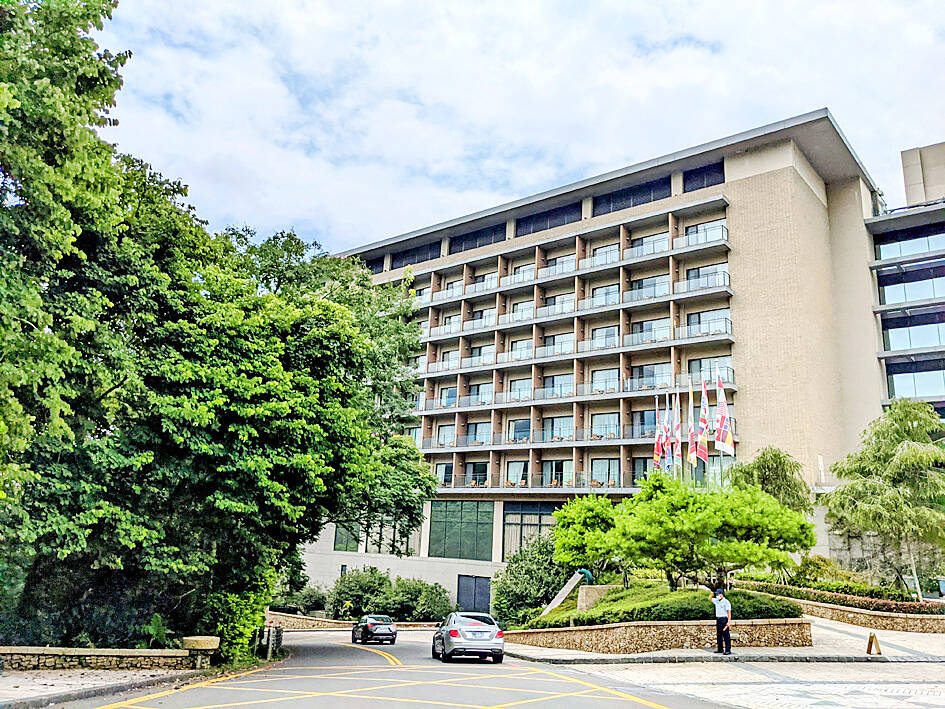Taiwan’s two major hospitality service providers expressed caution following a noticeable decline in consumer confidence in the wake of US tariff hikes and the local currency’s sharp appreciation.
FDC International Hotels Corp (雲品國際) fared relatively well, with consolidated revenue last month rising 5.49 percent to NT$165 million (US$5.44 million) — the second-highest April performance in its history.
Cumulative revenue in the first four months was a record NT$905 million, edging up 0.61 percent from a year earlier, it said.

Photo: Liu Ping-chuan, Taipei Times
The New Taipei City-based conglomerate attributed the increase to strong domestic demand during the Tomb Sweeping Day and Children’s Day holidays, allowing occupancy rates at flagship properties — the Fleur de Chine Hotel (雲品溫泉酒店) near Nantou County’s Sun Moon Lake (日月潭) and the Palais de Chine Hotel (君品酒店) near Taipei Railway Station — to remain stable.
Enhancements in dining services at the Taipei property’s executive floors led to a 26.1 percent advance in executive floor occupancy, contributing to higher room rates, it added.
Furthermore, FDC last month expanded its food and beverage operations in Taitung, which helped overall revenue, it said.
The group said it is looking to benefit from Mother’s Day tomorrow and Dragon Boat Festival on May 31.
Orders for zongzi (粽子, glutinous rice dumplings) have surpassed its annual target by 60 percent thus far to 80,000 pieces, aided by a surge in corporate demand for zongzi gift boxes, the company said.
FDC is eyeing a further business boost in hotel rooms from the annual Computex Taipei, one of the world’s leading technology exhibitions, later this month.
However, the local currency’s recent sharp appreciation could weigh on Taiwan’s inbound tourism, which would grow more expensive and less competitive to foreign visitors, FDC chairman Emile Sheng (盛治仁) said at a public function earlier this week.
Hotel operators have to respond to worst-case scenarios and seek to differentiate themselves from its rivals, Sheng said.
By contrast, restaurant operator Hi-Lai Foods Co (漢來美食) yesterday posted a revenue of NT$410 million for last month, down 15.77 percent from one month earlier, as consumer confidence softened amid US trade policy uncertainty.
US tariff hikes and local share price corrections took a toll on dining activity, the company said.
However, banquet demand at Grand Hi-Lai Hotel (漢來大飯店) in Taipei’s Nangang District (南港) remained strong, with a utilization rate of nearly 70 percent this year, it said.
Its Roast Duck restaurant saw revenue more than double, while its Cantonese Jade Garden Restaurant has started to generate profit, it said.
The company’s popular Island and Harbour buffet restaurants have fully been booked for Mother’s Day, it said.

Nvidia Corp chief executive officer Jensen Huang (黃仁勳) on Monday introduced the company’s latest supercomputer platform, featuring six new chips made by Taiwan Semiconductor Manufacturing Co (TSMC, 台積電), saying that it is now “in full production.” “If Vera Rubin is going to be in time for this year, it must be in production by now, and so, today I can tell you that Vera Rubin is in full production,” Huang said during his keynote speech at CES in Las Vegas. The rollout of six concurrent chips for Vera Rubin — the company’s next-generation artificial intelligence (AI) computing platform — marks a strategic

Enhanced tax credits that have helped reduce the cost of health insurance for the vast majority of US Affordable Care Act enrollees expired on Jan.1, cementing higher health costs for millions of Americans at the start of the new year. Democrats forced a 43-day US government shutdown over the issue. Moderate Republicans called for a solution to save their political aspirations this year. US President Donald Trump floated a way out, only to back off after conservative backlash. In the end, no one’s efforts were enough to save the subsidies before their expiration date. A US House of Representatives vote

Shares in Taiwan closed at a new high yesterday, the first trading day of the new year, as contract chipmaker Taiwan Semiconductor Manufacturing Co (TSMC, 台積電) continued to break records amid an artificial intelligence (AI) boom, dealers said. The TAIEX closed up 386.21 points, or 1.33 percent, at 29,349.81, with turnover totaling NT$648.844 billion (US$20.65 billion). “Judging from a stronger Taiwan dollar against the US dollar, I think foreign institutional investors returned from the holidays and brought funds into the local market,” Concord Securities Co (康和證券) analyst Kerry Huang (黃志祺) said. “Foreign investors just rebuilt their positions with TSMC as their top target,

REVENUE PERFORMANCE: Cloud and network products, and electronic components saw strong increases, while smart consumer electronics and computing products fell Hon Hai Precision Industry Co (鴻海精密) yesterday posted 26.51 percent quarterly growth in revenue for last quarter to NT$2.6 trillion (US$82.44 billion), the strongest on record for the period and above expectations, but the company forecast a slight revenue dip this quarter due to seasonal factors. On an annual basis, revenue last quarter grew 22.07 percent, the company said. Analysts on average estimated about NT$2.4 trillion increase. Hon Hai, which assembles servers for Nvidia Corp and iPhones for Apple Inc, is expanding its capacity in the US, adding artificial intelligence (AI) server production in Wisconsin and Texas, where it operates established campuses. This